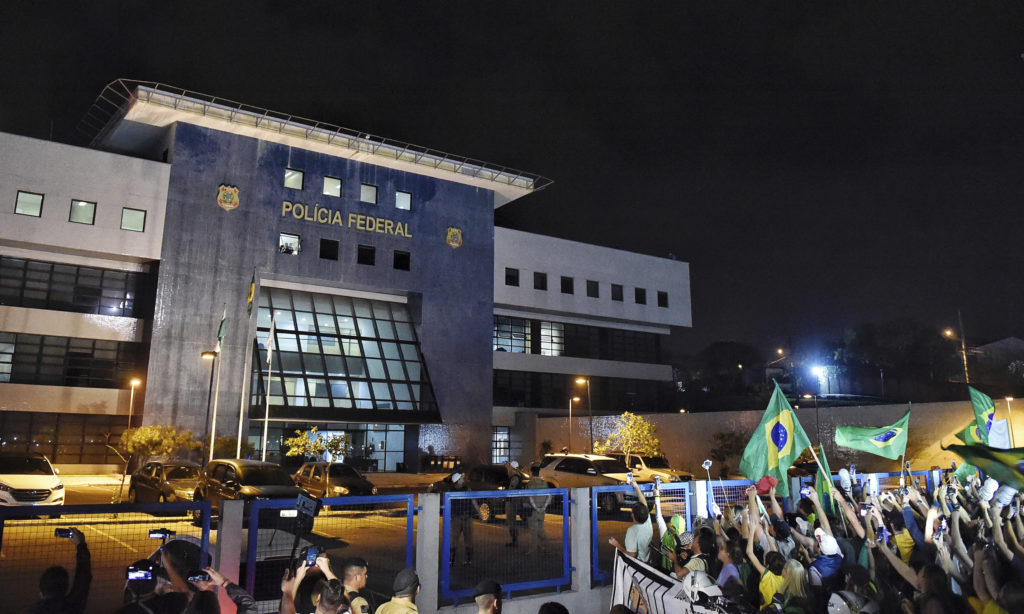(AP Photo/Felipe Dana)
(AP Photo/Felipe Dana)
Brazilians and friends of Brazil the world over are asking, how did we get here? The winner in Brazil’s second round of presidential elections on October 28, Jair Bolsonaro, is now infamous for highly incendiary comments in the last few years about women, Afro-Brazilians, gays, and the “heroic” torturers of Brazil’s 21-year military dictatorship. Whether Bolsonaro will temper his remarks and his policies now that he’s been elected remains to be seen, but his growing popularity has unleashed an unprecedented number of hate crimes and violence throughout the country.
In one of the best recent analyses among the hundred to appear in the past few weeks, Eliane Brum notes in El País that Bolsonaro won this election even before the first-round voting on Oct. 6, when he received 46 percent of votes against 17 percent for the Workers’ Party (Partido dos Trabalhadores, PT) candidate Fernando Haddad.
Starting in the late 2000s, Brazil’s perfect storm of negative trends opened the floodgates for the ascension of Bolsonaro, a retired army captain and a congressional representative for over 25 years. He has typically been affiliated with some of the smallest parties in Congress—until now. His current party, the Partido Social Liberal (PSL), now has the second largest number of seats in Congress after the Oct. 6 election.
The question for Brazil’s vibrant civil society... is how to respond to the inevitable human rights violations and retrenchment of social and environmental policies that will likely happen under a Bolsonaro administration...
In the 2000s, Brazil’s economic potential and its membership in the small group of BRIC countries led the Economist magazine to claim that “Brazil Takes Off” on its now infamous 2009 cover. But starting in 2013, the economic downturn and subsequent stagnation and recession (due in part to the drop in worldwide petroleum prices and China’s economic retrenchment, which affected Brazil’s soy exports) resulted in unemployment and a sense of hopelessness, especially among newly graduating youth.
The massive corruption scandal known as Lava Jato (Car Wash)—occurring on the PT’s watch, but affecting politicians and businessmen of all major parties and in twelve Latin American countries—gave a further pretext for attacking the PT and its redistributive economic and social policies.
Last but not least, the increase in violent crime, with over 63,000 homicides and multiple prison rebellions in 2017, as well as the spread of organized criminal factions throughout the country, added to Brazil’s sense of insecurity, leading to a search for a “savior.”
The question for Brazil’s vibrant civil society, social movements, and NGOs now is how to respond to the inevitable human rights violations and retrenchment of social and environmental policies that will likely happen under a Bolsonaro administration, to name just a few concerns. As the prospect of a Bolsonaro presidency became closer to a reality, an atmosphere of permissiveness towards intolerance, hate crimes, and violation of electoral laws permeated the country. Legal campaign demonstrations for Fernando Haddad have been met with pro-Bolsonaro police repression. Factory workers have been coerced into wearing pro-Bolsonaro t-shirts and attending campaign events. LGBT Brazilians and Afro-Brazilians have been openly attacked with little repercussion.
Protection of rights by other branches of government will be limited in the Bolsonaro era. The judiciary at all levels has shown an increasing politicization and decreasing independence in the past few years, most prominently seen in the ratification of Dilma Rouseff’s impeachment for non-impeachable offenses. The conviction and imprisonment of Lula based on shoddy evidence also demonstrated a concerning lack of independence in the judiciary, as the fast-moving case seemed clearly aimed at keeping Lula from being able to run again for president.

Demonstrators protest outside the Federal Police Department building where former Brazilian President Luiz Inacio Lula da Silva was taken in Curitiba, Brazil, on April 7, 2018 (AP Photo/Denis Ferreira).
Brazil’s Congress, already dominated by conservative caucuses known as the three B’s—Bible, Bull (agro-business), and Bullet (the gun lobby and the “law and order” candidates), is now fortified by Bolsonaro’s party, which increased from 5 to 54 seats in the first round of elections.
Finally, the re-emergence of the armed forces as a prominent political actor after decades in the shadows is a cause of great concern. Bolsonaro’s running mate is a retired army general, and Bolsonaro has indicated that military officials will likely be appointed to head at least five ministries.
“Dark times” may indeed be coming to Brazil. The work of human rights organizations to document crimes against the vulnerable, track potential abuses by the police and military, and keep the powerful accountable looks to be increasingly critical.